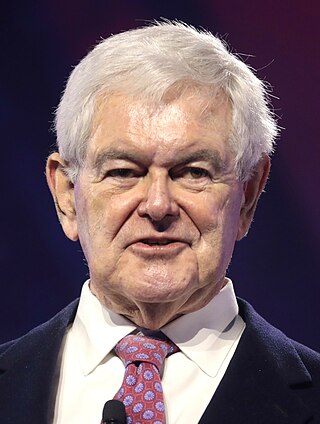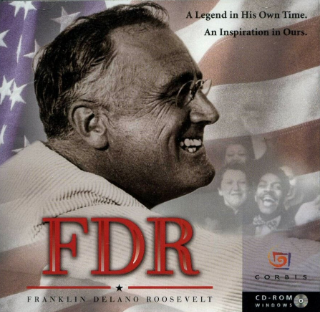Related Research Articles

The Four Freedoms were goals articulated by U.S. President Franklin D. Roosevelt on Monday, January 6, 1941. In an address known as the Four Freedoms speech, he proposed four fundamental freedoms that people "everywhere in the world" ought to enjoy:
- Freedom of speech
- Freedom of worship
- Freedom from want
- Freedom from fear

David Norman Bossie is an American political activist. Since 2000, he has been president and chairman of conservative advocacy group Citizens United and in 2016, Bossie was the deputy campaign manager to the Donald Trump presidential campaign.

Newton Leroy Gingrich is an American politician and author who served as the 50th speaker of the United States House of Representatives from 1995 to 1999. A member of the Republican Party, he was the U.S. representative for Georgia's 6th congressional district serving north Atlanta and nearby areas from 1979 until his resignation in 1999. In 2012, Gingrich unsuccessfully ran for the Republican nomination for president of the United States.

The National Advisory Commission on Civil Disorders, known as the Kerner Commission after its chair, Governor Otto Kerner Jr. of Illinois, was an 11-member Presidential Commission established in July 1967 by President Lyndon B. Johnson in Executive Order 11365 to investigate the causes of urban riots in the United States during the summer of 1967, and to provide recommendations to the government for the future.
William R. Forstchen is an American historian and author. A Professor of History and Faculty Fellow at Montreat College, in Montreat, North Carolina, he received his doctorate from Purdue University.

The "Day of Infamy" speech, sometimes referred to as just "The Infamy speech", was delivered by Franklin D. Roosevelt, the 32nd president of the United States, to a joint session of Congress on December 8, 1941. The previous day, the Empire of Japan attacked the United States military bases at the Pearl Harbor, Hawaii, and the Philippines, and declared war on the United States and the British Empire. The speech is known for its first line: "Yesterday, December 7, 1941—a date which will live in infamy..."
In United States politics, modern liberalism is a form of social liberalism that is one of two current major political factions in the United States. It combines ideas of civil liberty and equality with support for social justice. Economically, modern liberalism supports government regulation on private industry and opposes corporate monopolies. It opposes cuts to the social safety net, while simultaneously promoting income-proportional tax reform policies to reduce deficits. It supports a role for government in reducing economic inequality, increasing diversity, providing access to education, ensuring healthcare, regulating economic activity, and protecting the natural environment. This form of liberalism took shape in the 20th century as the voting franchise and other civil rights were extended to a larger class of citizens, most notably among African Americans and women. Major examples of modern liberal policy programs include the New Deal, the Fair Deal, the New Frontier, the Great Society, the Affordable Care Act, and the Infrastructure Investment and Jobs Act.

Wilson Watkins Wyatt was an American politician who served as Mayor of Louisville, Kentucky from 1941 to 1945 and as the 43rd Lieutenant Governor of Kentucky from 1959 to 1963. He was a member of the Democratic Party.

Stephen Henderson Talbot is a TV documentary producer, reporter and writer. Talbot directed and produced "The Movement and the 'Madman' " for the PBS series American Experience in 2023. He is a longtime contributor to the Public Broadcasting Service (PBS) and worked for over 16 years for the series Frontline.
Liberalism in the United States is based on concepts of unalienable rights of the individual. The fundamental liberal ideals of freedom of speech, freedom of the press, freedom of religion, the separation of church and state, the right to due process, and equality under the law are widely accepted as a common foundation of liberalism. It differs from liberalism worldwide because the United States has never had a resident hereditary aristocracy, and avoided much of the class warfare that characterized Europe. According to American philosopher Ian Adams, "all U.S. parties are liberal and always have been. Essentially they espouse classical liberalism, that is a form of democratised Whig constitutionalism plus the free market. The point of difference comes with the influence of social liberalism and the proper role of government."

David E. Kaiser is an American historian whose published works have covered a broad range of topics, from European warfare to American League baseball. He was a Professor in the Strategy and Policy Department of the United States Naval War College from 1990 until 2012 and has taught at Carnegie Mellon, Williams College, and Harvard University.
The Millennium Breach: The American Dilemma, Richer and Poorer was sponsored by the Eisenhower Foundation to mark the thirtieth anniversary of the Kerner Report on March 1, 1998. The Kerner Report was released by the Kerner Commission, a committee established by President Lyndon B. Johnson in 1968 to investigate the causes of the 1967 race riots in the United States and to provide recommendations for the future. The infamous passage of the Kerner Report found, "Our nation is moving toward two societies, one black, one white—-separate and unequal."
Newt Gingrich has declared his position on many political issues through his public comments and legislative record, including as Speaker of the House. The political initiative with which he is most widely identified was the Contract With America, which outlined an economic and social agenda designed to improve the efficiency of government while reducing its burden on the American taxpayer. Passage of the Contract helped establish Gingrich's reputation as a public intellectual. His engagement of public issues has continued through to the present, in particular as the founder of American Solutions for Winning the Future.

The 2012 presidential campaign of Newt Gingrich, former U.S. Representative from Georgia and Speaker of the House, began shortly following the 2010 midterm elections. He was politically active during the midterm elections, and helped several Tea Party-backed Republicans with his endorsements and fundraising abilities.

This timeline of modern American conservatism lists important events, developments and occurrences which have significantly affected conservatism in the United States. With the decline of the conservative wing of the Democratic Party after 1960, the movement is most closely associated with the Republican Party (GOP). Economic conservatives favor less government regulation, lower taxes and weaker labor unions while social conservatives focus on moral issues and neoconservatives focus on democracy worldwide. Conservatives generally distrust the United Nations and Europe and apart from the libertarian wing favor a strong military and give enthusiastic support to Israel.
Franklin D. Roosevelt, the 32nd President of the United States, has inspired or been portrayed in numerous cultural works.

FDR is a 1996 interactive CD-ROM game developed by Corbis. The title allows players to explore the life and times of Franklin D. Roosevelt through imagery, documents, video, a timeline, and other multimedia.

The third presidential term of Franklin D. Roosevelt began on January 20, 1941, when he was once again inaugurated as the 32nd president of the United States, and the fourth term of his presidency ended with his death on April 12, 1945. Roosevelt won a third term by defeating Republican nominee Wendell Willkie in the 1940 United States presidential election. He remains the only president to serve for more than two terms. Unlike his first two terms, Roosevelt's third and fourth terms were dominated by foreign policy concerns, as the United States became involved in World War II in December 1941.

Julian Emanuel Zelizer is a professor of political history and an author in the United States at Princeton University. Zelizer has authored or co-authored several books about American political history; his focuses of study are the second half of the 20th century and the 21st century.
The foreign policy of the United States was controlled personally by Franklin D. Roosevelt during his first and second and third and fourth terms as the president of the United States from 1933 to 1945. He depended heavily on Henry Morgenthau Jr., Sumner Welles, and Harry Hopkins. Meanwhile, Secretary of State Cordell Hull handled routine matters. Roosevelt was an internationalist, while powerful members of Congress favored more isolationist solutions in order to keep the U.S. out of European wars. There was considerable tension before the Attack on Pearl Harbor in December 1941. The attack converted the isolationists or made them irrelevant. The US began aid to the Soviet Union after Germany invaded it in June 1941. After the US declared war in December 1941, key decisions were made at the highest level by Roosevelt, Britain's Winston Churchill and the Soviet Union's Joseph Stalin, along with their top aides. After 1938 Washington's policy was to help China in its war against Japan, including cutting off money and oil to Japan. While isolationism was powerful regarding Europe, American public and elite opinion strongly opposed Japan.
References
- ↑
- Driver, Justin (April 9, 2018). "The Report on Race That Shook America". The Atlantic . Retrieved September 4, 2020.
- Jenkins, Chadwick (July 16, 2018). "The Rationality of Violence: The Kerner Commission and the Riots of 1967". PopMatters. Retrieved September 4, 2020.
- Jones, William P. (April 5, 2018). "The Missed Opportunity of the Kerner Report". The Nation . ISSN 0027-8378.
- Kosner, Edward (March 2, 2018). "'Separate and Unequal' Review: 'Two Societies, One Black, One White'". Wall Street Journal . ISSN 0099-9660.